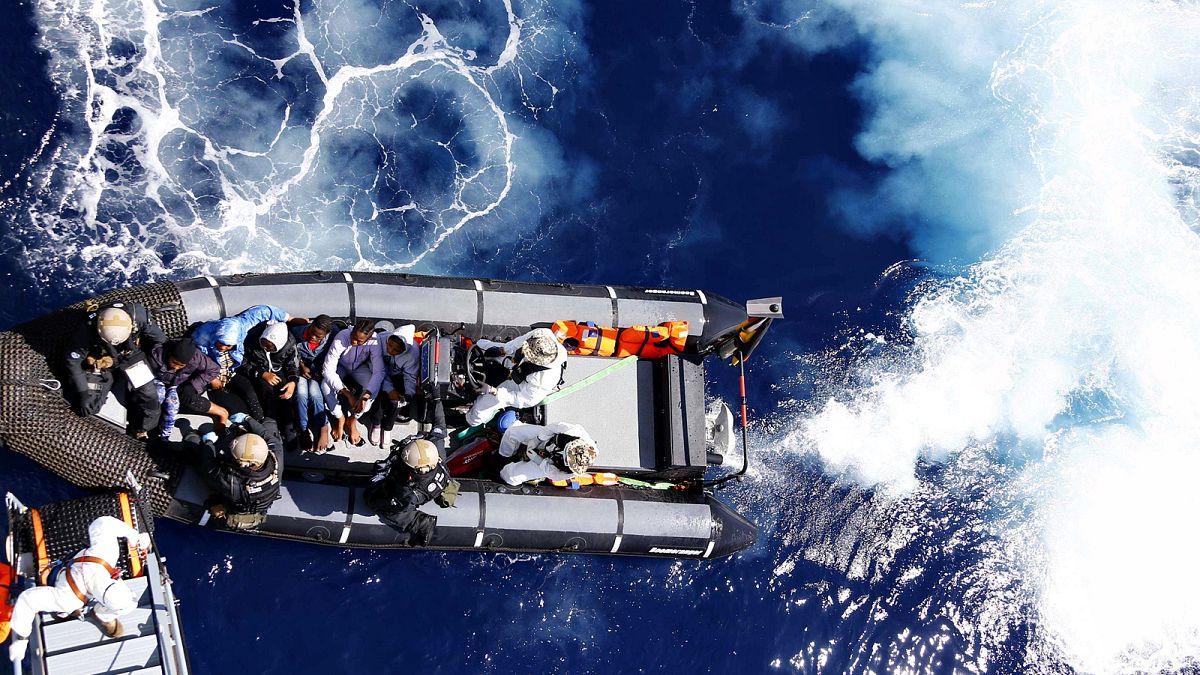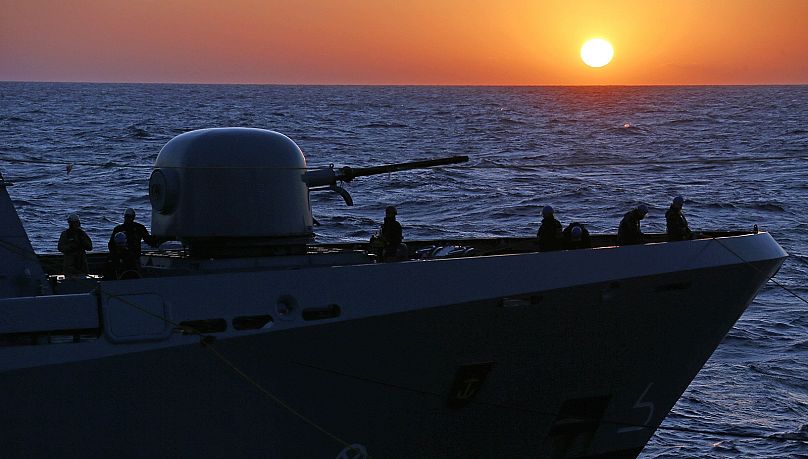After a sudden influx of migrants overwhelmed the island of Lampedusa, Italy is rushing to come up with an effective method to curb new arrivals, with an open willingness to test the limits of international law.
The images of Lampedusa, an island of over 6,500 citizens crowded by more than 10,000 asylum seekers within days, have unleashed a new political crisis in Italy, which has long carried the unenviable responsibility of being the go-to destination for undocumented migrants wishing to reach the European Union.
Prime Minister Giorgia Meloni, who last year formed the most hard-right government in Italian history, reacted by vowing to take "extraordinary measures" to drastically reduce the influx of migrants "managed by unscrupulous traffickers."
Meloni made a direct appeal to Brussels framing the emergency situation in Lampedusa as a pivotal question that the whole of Europe must answer as one.
In a recorded speech, Meloni said Italy wants “a total paradigm shift: stop human traffickers and mass illegal immigration upstream, and focus on the defence of the external borders".
European Commission President Ursula von der Leyen quickly flew to Lampedusa with a 10-point action plan that mostly included old ideas but one succinct proposal caught the attention of politicians and journalists.
"Explore options to expand naval missions in the Mediterranean," it reads.
The choice of words wasn't coincidental. Meloni had demanded a "European mission, including a naval one if necessary" to prevent migrant vessels from ever reaching Italy. Her interior minister, Matteo Piantedosi, called for an even more radical solution: a naval blockade
'No vessels in, no vessels out'
It didn't take long for the term naval blockade ("blocco navale" in Italian) to make headlines across the EU and inflame the debate.
But although talks of blockade might be appealing for politicians who rely on an exasperated electorate to stay in office, the concept entails extremely serious consequences.
Strictly speaking, any blockade, be it by sea, air or land, is considered an act of war and requires the existence of at least two belligerents, one of whom conducts the operation in order to isolate the other from commercial flows, supply chains and communication lines. The ultimate goal is to cripple the adversary's military and hamstring its economic growth.
Ongoing cases of blockades are Russia's continued obstruction of Ukraine's access to the Black Sea, the Saudi Arabia-led blockade imposed on Yemen, and Israel's stringent restrictions along the Gaza Strip.
"A naval blockade is not a peacetime operation. A naval blockade only occurs, as it's currently understood, during international armed conflict," Phillip Drew, an assistant dean at Queen's University and author of the book The Law of Maritime Blockade, told Euronews in an interview.
"Part of the requirement for a blockade is that it blocks everything. No vessels in, no vessels out. It doesn't matter what their intent is. It doesn't matter who owns them."
As Italy and Tunisia are nowhere near an armed conflict – in fact, they are bound by a new memorandum of understanding – a naval blockade is out of the question, says Drew, who believes "the use of the terminology is unfortunate."
Italy can still establish a conventional naval operation to deter migrant vessels from arriving at its shores. In order to achieve maximum efficiency, experts say, the intervention should be carried out as close as possible, or even inside, the Tunisian coastline to prevent vessels from even departing.
But such a 24-hour presence at sea would be extremely time-consuming and resource-intensive for a country, and would fall foul of international law, including a prohibition to operate in the territorial waters of another sovereign state, which extend to up to 12 nautical miles (22 kilometres) from its baseline.
There are, however, two ways to bypass this prohibition: securing the explicit consent of the sovereign state (in this case, Tunisia) or obtaining a resolution from the United Nations Security Council that legalises the military intervention.
Both scenarios, alluded to by Italian officials, face an uphill struggle.
In the memorandum of understanding, Tunis added a paragraph in which it "reiterates its position that it is not a country of settlement for irregular migrants" and "its position to control its own borders only".
Obtaining help from the UN Security Council, where Russia holds veto power as a permanent member, might prove even harder. The Security Council would need to conclude that, based on Article 39 of the UN Charter, the influx of undocumented migrants departing from Tunisia constitutes a threat to international peace and security.
This qualification would enable countries to introduce all sorts of remedies to restore order in the region. Article 42 speaks of "demonstrations, blockade, and other operations by air, sea, or land forces" as possible methods.
"If the Security Council were to say: 'All right, we're going to require Tunisia to allow other forces in.' That's a significant imposition on the sovereignty of a nation of the United Nations. And that is not something that is done on a whim," said Professor Drew.
"It would require a very serious circumstance. This is a serious circumstance, but it certainly isn't a first option. It would be a last-ditch option."
Sophia's unexpected comeback
Faced with legal quandaries and logistics nightmares, Italy is looking at the past to find a future-proof solution.
The name of Sophia has been invoked as a blueprint for a maritime operation that could successfully prevent migrants from reaching Italy — without risking breaching international law.
Set up in May 2015, Sophia was an EU naval mission designed to combat networks of human smugglers and traffickers in the southern and central Mediterranean. It had an annual budget of almost €12 million and used military boats provided by member states to monitor the waters for suspicious activities.
The EU Council structured Sophia in three phases but only the first two stages were ever activated, allowing the mission to board, search, seize and divert vessels believed to be illegally transporting migrants.
Sophia's exact geographical scope was confidential but the patrolling took place near Libya, a country engulfed by a chaotic civil war and exploited by smugglers as a getaway. The mission's mandate was later reinforced by a UN Security Council resolution to enforce the arms embargo against Libya.
Although its main goal was to crack down on human trafficking, Sophia was firmly bound by two fundamental norms: the duty to rescue people in distress and the principle of non-refoulment, which forbids countries from sending asylum seekers to a country where they face a risk of torture, persecution or any other serious harm.
According to the EU Council, Sophia saved almost 45,000 people at sea.
Austria, Hungary and Italy claimed this demonstrates the mission was a "pull factor" that encouraged migrants to cross the Mediterranean in hopes of being saved by Sophia and taken to European soil.
The mission was terminated in March 2020.
Now Italy wants to finish the work. "The naval blockade could be included in the Meloni Agenda, as the prime minister explained, if the Sophia mission were to be completed," Minister Piantedosi told Radio1, referring to the third phase.
Under Sophia's third phase, naval forces would be empowered to take "all necessary measures" against vessels suspected of human smuggling or trafficking, "including through disposing of them or rendering them inoperable." Crucially, this forceful intervention would take place inside the "territory" of a sovereign state.
For the European Commission this would not amount to a blockade, as Piantedosi suggested, as the destruction of vessels could only be carried out after assisting the migrants on board.
What's more, it would be constrained by the same obligations that applied to the original mission: respect for national sovereignty, international consent and the duty to rescue.
"With respect to phase three of Sofia being a blueprint, I don't see that happening anytime soon. Absent consent under international law, there is no way to move into the territorial waters of Tunisia to effectuate any dismantling, at least from a European Union perspective," said Joyce De Coninck, a post-doctoral fellow with Ghent University who has researched Operation Sophia.
During Sophia's existence, neither Libyan consent nor a UN resolution was ever obtained. The absence left EU boats patrolling a wide area of international waters, as originally envisioned, rather than working closer to the Libyan coastline.
"At best, an operation that replicates Sophia would be operation phase two of Sophia, which allowed for boarding, search, seizure and and diversion on high seas," De Coninck told Euronews. "But again, that would entail that human rights obligations are triggered as soon as you are in physical proximity of a distressed vessel."

